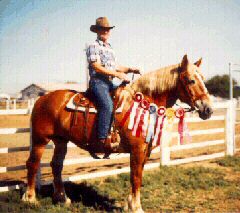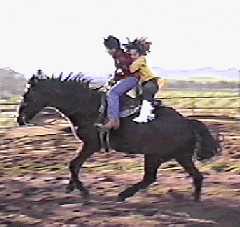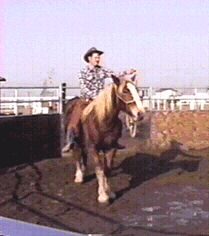Mistakes: |
Where's the Airbag???
| |||
|
Horse handling is full of mistakes. Even the pros make them. Each horse responds a little bit differently from another when first handled. An aid given just a little bit too strongly can cause the horse to "over respond," (e.g., roll away rather than just slow down). The handler being slightly out of position can cause the horse to "see" a different message than the one intended. So why does the professional clinician look so "perfect?" First of all, the professional is constantly reading the horse. When he senses the horse responding incorrectly, he will make adjustments to his cues to correct things. If he blows it and can't make the correction, he simply goes with whatever response the horse gives him. A professional musician doesn't stop playing when he hits a bad note and neither does the professional trainer. Let's pull this all into perspective for the less experienced handler working an inexperienced horse. | ||||
|
"Isn't this going to confuse the horse???" Not if you take the right approach. Let's say you are in the round corral or on a longe line and your intention was to slow a trotting horse to a walk. You apply pressure or energy in front of the horse, but instead of slowing down, he ducks and reverses. Your intention was to slow him down. Your message said roll-away. The horse was doing fine. What happened was a breakdown between your intention and your actual message. Now, if you got upset because the horse couldn't somehow grasp your intention, you will break down the training process. The horse saw you ask him to yield, which he did, and it's not appropriate for you to get upset about it. The difference between the amateur and the pro is that the amateur "stops playing" on the bad note (or worse, punishes the horse) while the pro quickly realizes, "Ooops!," goes with the mistake and supports the horse in his new direction. Thus the horse (or anyone watching) never suspects that a mistake occurred and the handler can make an adjustment the next time he/she attempts the cue. |
Filly's First Ride
| |||
|
| ||||
|
Later when you are confident in your cues and the horse is really trying to avoid the task, you can worry about discipline. |
 | |||
Continue to How Horses LearnPress "Back" to return to the page that brought you hereGo to Case Study SectionReturn to Training SectionReturn to Wild Horse MentorsReturn to KBR World of Wild Horses and BurrosGo To
| ||||



